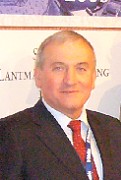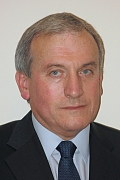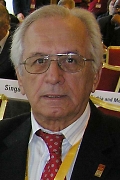FIG Commission 3

|
Work Plan 2011-2014
 Original work plan in .pdf-format.
Original work plan in .pdf-format.
Spatial Information Management (SIM)
 |
Mr. Yerach Doytsher, Chairperson of Commission 3 |
Terms of reference
- Management of spatial information about land and property (data, tools,
methods, policies, processes, procedures, standards, regulations);
- Spatial data infrastructure – collection technology, integration
processing, maintenance, visualization, standardization, and dissemination
(technical, organizational, personnel, administrative, research, financial,
policy, and legal aspects);
- Management and dissemination of knowledge and skills for SIM
(educational, professional development and capacity building aspects);
- Impacts on organizational structure, business models,
Public-Private-Partnerships, professional practice and administration;
- Management of spatial information supporting good governance
(sustainable development, social and economic growth and poverty reduction,
environment protection, democracy, freedom, participation in decision
making, social security).
Mission Statement
The mission of Commission 3 is to:
- Increase awareness about successful SIM approaches and achievements
within the “e-Society” by showing good practice like availability,
reliability, efficiency and accessibility of spatial information for better
decision making and processes.
- Support the use of spatial information and SIM-tools by surveyors and by
all participants in decision-making to serve the goals of good governance.
- Share good practice on managerial processes and infrastructure required
for data handling, using information and distributing knowledge.
- Share good practice and develop high-level methods and techniques for
merging and managing updated spatial information at various levels according
to market requirements.
- Establish and maintain data - and data-quality-standards relevant to
SIM, while cooperating with international spatial data standard committees.
- Encourage the use of spatial information within e-government and
e-commerce.
- Cooperate and coordinate with the related United Nations Committees and
other geospatial information societies and organizations active in the field
based on request from the Council, they key focus will be in co-operation
with ISPRS (Commission IV on Geodatabases and Digital Mapping), ICA
(commission on Geospatial Data Standards), GSDI, EUROGI.
General
Commission 3 Working Groups will focus on the contribution of spatial
information for sustainable development. Commission 3 delegates have expressed
their strong interest in organizing Commission 3 annual meetings and workshops
focused on the specifically identified needs/topics. Commission will continue
peer review option at its own symposia and by producing peer reviewed
proceedings and/or special issues of international professional journals.
Commission will continue to address the phenomenon of rapid urbanization and its
impacts with a particular focus on identifying spatial tools and general
principles, norms and standards for good governance using reliable and
accessible spatial information. It will also provide guidance to interested
countries to successfully address the problem of rapid urbanization. Commission
will continue the successful work presented in the FIG publication no. 48 on
“Rapid Urbanization and Mega Cities: The Need for Spatial Information
Management”. This activity will be continued with focusing firstly on small and
medium size urban areas and cities vs. mega cities, and secondly on widening its
scope in order to take into account the land aspects of SDI (sub-division and
ownerships, planning and zoning, lands occupancies) – legal, technical and
administrative issues.
The topics of general interest to Commission 3 are:
- Web Services and Metadata;
- SIM Infrastructure and standards;
- State of the art of SDI and GSDI;
- Technical aspects, integration of information, 2D/3D/4D applications of
SDI, geo-visualization of information, seamless information management and
maintenance;
- SIM applications for environmental protection, disaster management and
risk assessment, social and economic growth, informal/unplanned development
management;
- Transferring /sharing knowledge focusing on “low-cost” methods and tools
for spatial information collection and management.
Policy Issues
SIM has the role of an integrator of components for a Spatial Information
Infrastructure especially for urban areas within the information society. SIM
is a facilitator for IT based services for planners, administration as well as
for citizens. The topics of this activity are:
- NSDI / GSDI: Spatial Data + Information Infrastructure
- Modelling, geo-visualization
- Legal aspects in SIM
- SIM and LBS as tools:
- Making geo-database suitable for mobile phones
- Improve basic references (geo-referencing, transport-internet)
- Role of surveyors in LBS
- Share current experiences and technical visions of the future.
- Gain knowledge from industry.
- Inform future decisions and implementations.
- Inform the big picture on drivers, trends and technologies.
Chair
 |
Prof. Dr. Hartmut Mueller
GERMANY,
E-mail: hartmut.mueller[at]geoinform.fh-mainz.de |
Deliverables
- FIG-publication on guidelines to establish an efficient SIM
Infrastructure in urban areas addressing legal, institutional and technical
issues (a joint publication together with WG 3.2). To be published at the
FIG Congress 2014.
Beneficiaries
- Surveyors, associations engaged with spatial data, local and regional
municipalities and users of spatial data and spatial information.
Policy issues
New tools, techniques and policies are required to baseline and integrate the
social, economic and environmental factors associated with spatially managing
urban areas in general and cities/megacities in particular. Inter alia, to
monitor growth and change across the urban environment and to forecast areas of
risk – all within shorter timeframes than previously accepted. Moreover, they
must be flexible enough to meet traditional needs such as land development,
tenure and value applications, but be designed to be interoperable and integrate
within the city wide SDI as it evolves. There is a need to have access to
spatial data from wide range of sources, to integrated spatial information from
the SDI and thus leading to a more joined-up, proactive decision making allowing
the prioritising of scarce resources to tackle the most sensitive and risk prone
areas. Within the list of sub-titles includes:
- Technical Aspects
- Data collection, recording and updating, low-cost methods and tools
for environmental monitoring,
- Renewable and innovative technologies for data collection
(photogrammetry, LiDAR, crowd sourcing, PDAs, cell-phones, etc.),
- Visualization of information,
- Standardization of information and metadata,
- 2D, 3D, 4D spatial data recording and management to support the
legal integration of informalities, the decision making, the
risk-assessment and disaster management in areas with informal
settlements,
- Integration and update of spatial data-bases regarding ownership
rights, value of real estate property, and state applied regulations and
restrictions on the use rights, tools, and Land Information Systems
These technical aspects will be dealt in relation to legal, social, economic,
educational, and policy implications
Chair
|
|
Prof. Dr. Ioannidis Charalabos
GREECE,
E-mail: cioannid[at]survey.ntua.gr |
Deliverables
- FIG-publication on guidelines to establish an efficient SIM
Infrastructure in urban areas addressing legal, institutional and technical
issues (a joint publication together with WG 3.1). To be published at the
FIG Congress 2014.
Beneficiaries
- Surveyors, private and public firms and associations engaged with
spatial data, and users of spatial data and spatial information.
Working Group 3.3 - 3D Cadastre (Joint Working Group with
Commission 7)
The increasing complexity of infrastructures and densely built-up areas
requires a proper registration of the legal status (private and public), which
only can be provided to a limited extent by the existing 2D-cadastral
registrations. Despite all research and progress in practise, no country in the
world has a true 3D-Cadastre, the functionality is always limited in some
manner; e.g. only registering of volumetric parcels in the public registers, but
not included in a 3D cadastral map, or limited to a specific type of object with
ad hoc semi-3D solutions; e.g. for buildings or infrastructure. The main
objective of the working group is to establish an operational framework for
3D-Cadastres. The operational aspect addresses the following issues:
- A common understanding of the terms and issues involved. Concepts should
be refined and agreed based on the ISO 19152 Land Administration Domain
Model.
- A description of issues that have to be considered (and to what level)
before whatever form of 3D-cadastres can be implemented. These will provide
'best practices' for the legal, institutional and technical aspects.
Topics to be dealt within the activity of the working group are:
- 3D-Cadastre: models, SDI and time
- 3D-Cadastre and the usability
Options for realization of a 3D cadastre model will include:
- Minimalistic 3D cadastre (no cables, pipelines etc.)
- Topographic 3D cadastre
- Polyhedral vs. Non-polyhedral Legal 3D cadastre
- Topological Legal 3D cadastre
Chair
 |
Prof. Dr. Peter van Oosterom
THE NETHERLANDS
E-mail:
P.J.M.vanOosterom[at]tudelft.nl |
Deliverables
- FIG-publication on guidelines to establish 3D-cadastres (a “primer on
3D-Cadastres”), addressing legal, institutional and technical issues. To be
published at the FIG Congress 2014.
- A second workshop on 3D-Cadastres - November 2011 (Delft, 10 years after
the first workshop).
- In addition at the FIG working weeks, joint commission 3 and 7 sessions
on 3D-Cadastes will be organized. Depending on the need and results
- A third workshop on 3D-Cadastres could be organized in 2013 or 2014
preferably in conjunction with another FIG meeting (Working Week, commission
3/7 annual meeting, congress).
Beneficiaries
- Surveyors, land developers, national cadastral agencies, land registry
administrations, local and regional municipalities.
Workshops
Commission 3 is planning to organize, in addition to its activity during the
annual FIG Working Weeks or Congress, also four annual Workshops during the
2011-2014 term. The planned meetings are:
Co-operation with Sister Associations
- ISPRS Commission IV on Spatial Information Systems and Digital Mapping
- ICA - International Cartographic Association
- International Geographical Union, Commission on geographical Information
Science
- GSDI – Global Spatial Data Infrastructure Association
Calendar of Events
- May 2011 - Marrakesh (in conjunction with FIGWW 2011)
- September 2011 - Paris, France (annual workshop)
- May 2012 - Rome, Italy (in conjunction with FIGWW 2012)
- September 2012 - annual workshop (location TBD)
- April/May 2013 - Abuja, Nigeria (in conjunction with FIGWW 2013)
- September 2013 - annual workshop (location TBD)
- May 2014 - Kuala Lumpur, Malaysia (in conjunction with XXV FIG Congress)
- September 2014 - annual workshop (location TBD)
Commission
Officers
Commission
Chair
 |
Prof. Yerach Doytsher
The Abel Wolman Chair in Civil Engineering
Dean, Faculty of Architecture and Town Planning
Technion - Israel Institute of Technology
Technion City
Haifa 32000
ISRAEL
Tel. + 972 4 829 4001
Fax + 972 4 829 5641
E-mail: doytsher[at]technion.ac.il
|
Vice Chair of Administration (Communication)
 |
Dr. Sagi Dalyot
GERMANY / ISRAEL
E-mail:
Sagi.Dalyot[at]ikg.uni-hannover.de |
Vice-Chair for Administration (Events)
 |
Mr. Gerasimos Apostolatos
Surveyor Engineer, Technical Governmental Consultant
29, Ag. Filotheis str.
Filothei, 15237
GREECE
Tel. + 30 210 6825 905
E-mail: gapos[at]tee.gr |
Vice Chair and Chair of WG 3.1 - SIM Infrastructure
 |
Prof. Dr.-Ing. Hartmut Müller
Fachhochschule Mainz
FBI - Geoinformatik und Vermessung
Holzstr. 36
55116 Mainz
GERMANY
Tel. + 49 6131 2859 674
Fax + 49 6131 2859 699
E-mail:
mueller[at]geoinform.fh-mainz.de |
Vice Chair and Chair of WG 3.2 -
Technical Aspects of SIM
|
|
Prof. Dr. Ioannidis Charalabos
GREECE,
E-mail: cioannid[at]survey.ntua.gr |
Vice Chair and Chair of WG 3.3 - D Cadastre
 |
Peter van Oosterom
Delft University of Technology
OTB, Section GIS-technology
P.O. Box 5030
2600 GA Delft
THE NETHERLANDS
Tel. +31 15 2786950
Fax +31 15 2784422
E-mail:
P.J.M.vanOosterom[at]tudelft.nl
website http://www.gdmc.nl |
9 August 2011 |

